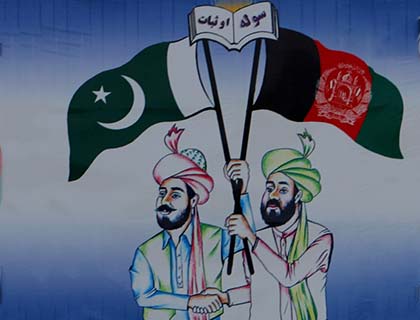A high level delegation of the Afghanistan's High Peace Council led by Chairman Salahuddin Rabbani visited Islamabad, on November 12-15, 2012, upon the invitation of Pakistani Foreign Minister Hina Rabbani Khar. The delegation called upon Pakistani President Asif Ali Zardari and Prime Minister Raja Pervez Ashraf and met with Foreign Minister and General Ashfaq Kayani the Pakistani Chief of Army Staff. The delegation also held meetings with Pakistan's religious and political leaders.
Both sides had an extensive exchange of views including briefing by the Pakistan authorities on the investigation of the assassination of Shaheed Ustad Burhanuddin Rabbani. Both sides agreed on the following joint statement:
2. The HPC delegation briefed the Pakistan side on the progress made in the peace and reconciliation process and underlined the importance of Pakistan's role in this regard. Pakistan supports Afghanistan's vision and roadmap for achieving durable and lasting peace in Afghanistan.
3. The two sides appealed to the Taliban and other armed opposition groups to participate in the Afghan-led and Afghan-owned reconciliation process to end violence.
4. In support of peace and reconciliation process and in response to the requests of the Afghan government/HPC, a number of Taliban detainees are being released.
5. All concerned countries including Pakistan, Afghanistan and USA will facilitate safe passage to potential negotiators to advance the reconciliation process.
6. Pakistan and Afghanistan will work closely with other international partners to remove the names from the UN sanctions list of the potential negotiators amongst Taliban and other groups to enable them to participate in peace talks.
7. The two sides agreed to jointly work for holding an Ulema Conference which will include religious scholars from Pakistan, Afghanistan and other Islamic countries. The conference could either be held in Saudi Arabia, Afghanistan, Pakistan or any other Islamic country. The Ulema Conference would address the issue of rising militancy and suicide attacks in the name of religion and the defamation of our glorious and peaceful religion Islam due to its unjustified linkage with terrorism.
8. Pakistan and the High Peace Council called on the Taliban and other armed groups to sever all links with Al-Qaida, and other international terror networks.
9. The two sides recognized that close and consistent cooperation between Afghanistan and Pakistan is key to building trust and confidence between the two countries and strengthening joint bilateral efforts in promoting peace and stability as well as overcoming the ongoing trends of violence and extremism. They called for long term and consistent mutual cooperation based on mutual interest and respect.
10. The two sides stressed that talking to and maligning each other through media leaves little space for serious dialogue. Therefore, all government officials and spokespersons should refrain from making hostile statements and avoid blame game.
11. The High Peace Council and Pakistani authorities discussed the issue of cross border incursions and shelling. It was decided to discuss ways and means to create conducive conditions and initiating bilateral mechanisms that would completely end the cross-border shelling. The contacts between Pakistan Army and Afghan National Army in this regard were lauded and encouraged.
12. To initiate an effective mechanism in order to facilitate consistent and practical steps, the Ministry of Foreign Affairs of Pakistan and the High Peace Council of Afghanistan agreed to have more frequent contacts to enhance peace and stability in Afghanistan and the region.
Islamabad,
14 November 2012

